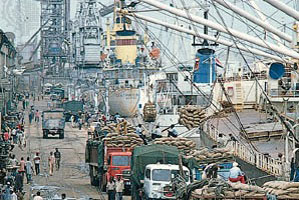Currently, projects exist on multiple industrial sectors and their employment and welfare realities, and regions with ongoing and planned projects across several countries.
There are three ongoing core projects at the TCLab Lab using quantitative, qualitative and visual techniques (details are available upon request).
Current Themes:
Taking a sectoral approach, this focus is on re-visiting of dualism and informality from the standpoint of the socio-political context within which work is organized and re-organized, local economic governance and pressures for urban development, the conditions under which cooperation mechanisms and movements for social protections appear to be emerging within these sectors. |
"New" Industrial Groups and Industrial WelfareTraditional industrial relations in several countries are premised on specific roles for State and worker representation. This project looks across multiple countries and sectors at how the role of the State is formed and contested by several new identities. The State, Market and Innovation -- (Bio)pharmaceuticals, Industrial Welfare, and Healthcare AccessThis research analyses the changing context of market and welfare regulation in shaping health innovations and conditions of access to health care. The roles of State and market are central to this analysis. This project focuses on pharmaceuticals, biopharmaceuticals, and vaccines. One dominant mode of access being investigated is labor/work status and history of social protection. Research is completed on Indian pharmaceuticals and biopharmaceuticals and international vaccine efforts for HIV/AIDS and other illnesses. (Also see Srinivas 2007 forthcoming, Srinivas 2006, 2004. |
Several of the projects comprise a technology innovation and diffusion component. For example, the work on all 3 sectors involves some emphasis on process and product technologies, mechanization and trade-related technical standards. In addition, research with collaborators involves different approaches to innovation (e.g. see Srinivas and Sutz forthcoming 2007, " Developing Countries and Innovation: Searching for a New Analytical Approach", Technology in Society) |
Initiatives:
Very little detail is known about how investments and industrial policy options exercised by the national and regional State within large economies such as Brazil and India are affecting industrial employment and regional socio-economic development. The Columbia University Technology, Employment and Regional Inequality (TERI) Project is a comparative analysis of technological and industrial policy choices and their impact on intersectoral and regional employment inequalities observed both in India and Brazil. The TERI program contrasting Sao Paulo and Karnataka regions in Brazil and India, uses quantitative and qualitative techniques to study the nature of industrial change in the two regions, their political economy, and the employment, income, and health changes that they have sustained. We investigate if and how investments in mid- and high-tech sectors - a variable perceived as important in explaining economic growth- might be related to socio- economic inequality and regional indicators. We study how the industrial policy- employment-inequality link might be influenced by institutions for education, training, and health. These include capturing through industrial sector analyses the changing role(s) of the State and pressures on public institutions in both countries. The outcomes of the project will determine if and under what conditions the approaches developed here can be utilized to study other country contexts.
|
An innovative collaborative research and policy initiative with the Karnataka State Labour Inspectorate in S. India: the research is attempting to understand progressive planning on industrial employmnt, economic organization and social protections across the four southern Indian states which are among the fastest growing economic regions of the country (see statistics). This project focused primarily on Andhra Pradesh, Karnataka, Kerala, and Tamil Nadu states of south India, questions the conditions under which industrial and social policy priorities can be achieved through the institution of the labor inspectorate. Starting from the time of Polanyi, and registreing considerable economic and industrial policy attention today at the International Labour Organization, regional industry, and among several academics, labour inspection raises several interesting questions about street-level bureaucracy, and changing public economic governance. |
This program of historical and comparative research arising from Prof. Srinivas' past research on social protection. The ESPI program looks more systematically at the co-evolution of social protections provided by the State and several other stakholders, and the ways in which these reflect notions of participation, citizenship, cognitive self-identification, and industrial relations. In particular, the program queries the urban and regional roots and spatial manifestations of national social programs and their place in national economic goals. The ESPI program uses several diferent methods and attends to comparative international patterns in institutions of social protection and welfare regions. It uses this framework to study the nature of dualism and informality in employment relations and social inclusions. It also probes the secular vs. non-secular basis of social protections and community, urban and regional risk-pooling arrangements. There is a quantitative element built on expansion of programs, especially relationship of social insurance and economic development, and several qualitative components that capture the pace and spatial elements of institutional change in India and several other countires. |


